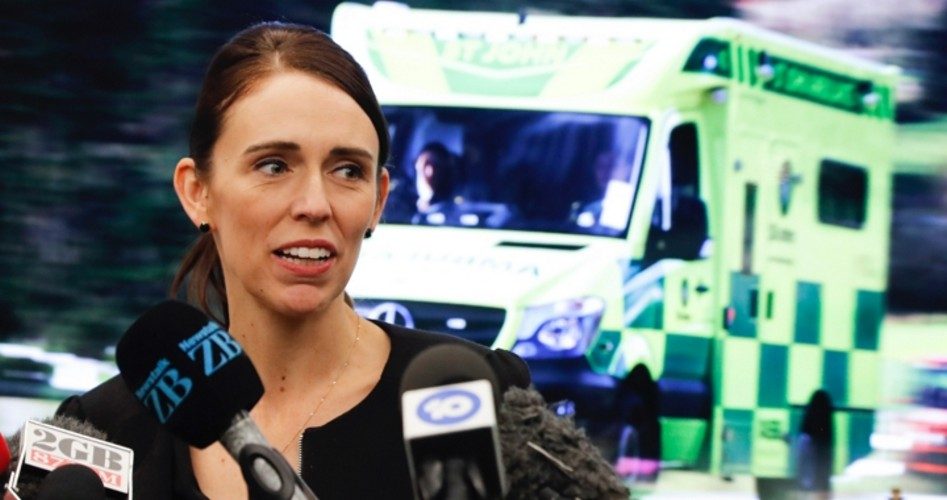
As The New American surmised on Monday, New Zealand’s Prime Minister Jacinda Ardern announced a country-wide ban on Thursday on “military-style semi-automatic weapons” in addition to “all assault rifles” which she hopes will be effective on April 11.
In New Zealand they do things differently than in America: Ardern announced the ban before the legislation had even been written. Included in her announcement (and presumably in the legislation, when it is written and passed by the compliant Parliament) will be a gun “buy-back” program to relieve gun owners of their firearms that will be criminalized under the legislation.
Said Ardern: “We will ban all high-capacity magazines. We will ban all parts with the ability to convert semi-automatic, or any other type of firearm, into a military-style semi-automatic weapon. In short, every semi-automatic weapon used in the terrorist attack on Friday [March 15] will be banned in this country.”
The ban presumably would ban shotguns and lever-action rifles which the shooter, Brenton Tarrant, also used to carry out his attack. Included in his arsenal were some car bombs, but Ardern failed to mention anything about banning them as well.
The ban would also prohibit people such as Abdul Aziz Wahabzadah, a worshipper at the Linwood mosque, from picking up one of Tarrant’s shotguns and using it successfully to thwart his second attack before it became a calamity, and preventing Tarrant from driving to a third mosque to continue his attack.
The ban will affect most of the legal gun owners in New Zealand, but none of the criminals who will always find a weapon to conduct their attacks. Just 242,000 people out of the country’s 4.5 million inhabitants have a license to own a firearm. There are an estimated 1.2 million to 1.5 million firearms owned privately, with no numbers available of the weaponry owned by criminals.
If a law-abiding citizen and gun owner defies the ban, the planned penalty will be $4,000 and/or three years in prison. Of course, in its final form, the ban could impose stiffer penalties.
The ban will have little if any impact on the country’s already low rate of violent crime, and it certainly will not prevent another incident like the Christchurch shooting. That’s partly because the shooter was no ordinary criminal, but a highly intelligent socialist intending not only to harm and kill as many innocents as possible, but also to make a statement directed at the United States. As The New American reported, Tarrant “wrote a manifesto and explained in it that he perpetrated his act with firearms precisely because of the “effect it would have on social discourse, the extra media coverage they would provide, and the effect it could have on the politics of the United States.”
We also noted that Tarrant had his choice of weaponry, but chose semi-automatic rifles for “marketing” purposes:
I could have chosen any weapons or means. A [homemade explosive that filled] a rental van, household flour [along with] a method of dispersion and an ignition source … a ball-peen hammer and a wooden shield. Gas, fire, vehicular attacks, plane attacks, any [number of] means were available.
I had the will and I had the resources.
What type of law would have prevented this deranged ideologue with means from conducting the outrage on Friday?
When the U.S. Congress passed a ban on semi-automatic rifles in 1994, it happily had a 10-year sunset clause. In 2004 much effort was expended to show whether the ban had a positive impact on gun violence in the United States. None could be found, and the ban expired. The point is, gun-control laws don’t reduce crime.
Then again, New Zealand is not the United States. It has no codified constitution, and thus has no Second Amendment or anything similar. It had no “Declaration of Independence.” In fact, its governmental structure is described as a unitary parliamentary constitutional monarchy with Queen Elizabeth II as ruling monarch, Dame Patsy Reddy its governor-general, and Jacinda Ardern its prime minister by dint of her being the equivalent of the U.S. speaker of the house through her ruling coalition of political parties.
Its culture and history therefore aren’t the same as America’s. The founders of New Zealand didn’t write something like this: “We hold these truths to be self-evident, that all men are created equal, that they are endowed by their Creator with certain unalienable Rights, that among these are Life, Liberty and the pursuit of Happiness.”
Or this: “A well-regulated militia being necessary to the security of a free state, the right of the people to keep and bear arms shall not be infringed.”
In addition, New Zealand doesn’t have 330 million citizens who own between 400 million and 600 million firearms, as is the case in America. New Zealand gun owners haven’t joined groups such as Gun Owners of America, The Second Amendment Foundation, the Citizens’ Committee for the Right to Keep and Bear Arms, the Rocky Mountain Gun Owners, and others to protect their right to keep and bear arms. Disarming the American populace, as is the ultimate goal of the leftists in this country, would be very difficult. Not so in New Zealand. The island’s compliant populace has not experienced the same “gun culture” that has been so prevalent in the United States since its founding.
New Zealand’s prime minister will see no decrease in her country’s already-low crime rate, but her constituents will see a vast increase in governmental control. They will shortly learn that “gun control” has nothing whatever to do with crime control, but everything to do with “people control.”
Photo: AP Images
An Ivy League graduate and former investment advisor, Bob is a regular contributor to The New American, writing primarily on economics and politics. He can be reached at [email protected].
Related article:
“There Will be No Opposition”: After Shooting, New Zealand Will Further Outlaw Guns



